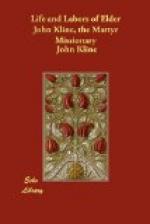SUNDAY, May 15. Diary: There is preaching at three places. We were made to witness a very distressing occurrence to-day in the sudden death of Brother Daniel Haines’s wife. She came into the meeting in her usual state of health, and in two hours she was a corpse. Death had done its work upon the body; but it could not touch the soul to which Jesus had given eternal life. “Hither shalt thou go, but no farther; and here shall all thy waves be stayed,” may be applied to death as it comes to the child of God, as appropriately as to the great ocean.
MONDAY, May 16. Come to the meetinghouse. Committees are appointed. Go to Jacob Saylor’s and take in questions. In the meantime preaching is going on at the meetinghouse as yesterday. We stay all night at Brother Deahl’s.
THURSDAY, May 17. Business progresses slowly.
WEDNESDAY, May 18. At about four o’clock it is announced that all the business before the meeting has been disposed of, and the meeting breaks up, with many farewell salutations and much tender feeling. We stay all night with John Waltman, married to Martin Deahl’s daughter.
MONDAY, May 23. Love feast at our meetinghouse. A great concourse of people, but good order. The brethren John Bowman and Daniel Crouse are here. They speak to good acceptance.
TUESDAY, May 24. Go to the Tristle meetinghouse. Christian Funk is buried. Age, eighty years, three months and nineteen days. He was a very consistent member of the Mennonite persuasion, and suddenly died in the meetinghouse, on Sunday before, in the very act of singing a devotional hymn with the congregation. Let us hope that as the song died on his lips here his soul caught its echo in heaven.
SUNDAY, June 19. Go to Philip Ritchey’s schoolhouse in the Gap. Speak from Jer. 7:23. TEXT.—“But this thing commanded I them, saying, Obey my voice, and I will be your God, and ye shall be my people.”
I said in substance: Man is to-day what he has ever been. “The carnal mind is enmity against God” now, quite as deep-seated in man’s heart as when he led his unholy and rebellious people out of Egypt. Man’s will now, as then, is contrary to God’s will. But God wants to change man’s will so as to incline it to good instead of evil. God is infinitely blessed and happy, because he is infinitely just and good. Man is unblessed and unhappy, because he is unholy and evil. One of the clearest proofs of man’s degeneracy is found in his willingness to remain in his sinful and unhappy state. Like the man among the tombs, he is ready to cry out, in thought if not otherwise, “Let us alone! what have we to do with thee? Art thou come to torment us before the time?”




